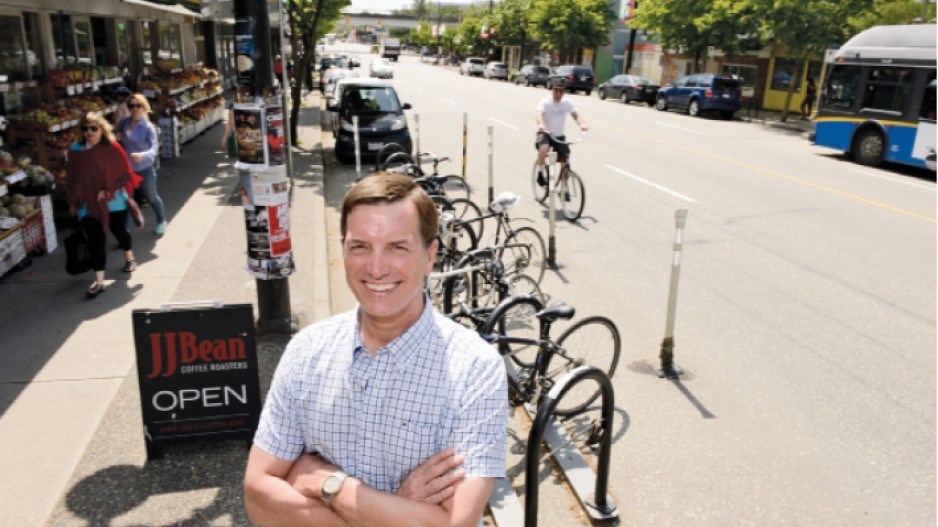A year ago, Steve Da Cruz was fighting the installation of a new bike lane on Union Street.
The owner of The Parker, an upscale vegetarian restaurant, had concerns about the design of the lane, which he still believes is unsafe. He was also leery about how the bike lane would affect the ability of customers to get to his restaurant.
After the city completed the bike lane, The Parker was hit hard by a 30% drop in business that lasted for around seven weeks, said Da Cruz, and deliveries are still a headache.
But business is now better than ever, and Da Cruz credits the rebound partly to customers – including tourists – who arrive by bike.
“We definitely have benefited from the increased usage of the bike lane,” Da Cruz said.
“A lot of the hotels offer bikes on day rentals, so we have seen increased usage because of that.”
While the recent expansion of bike lanes on several of Vancouver's commercial streets has alarmed businesses that are afraid of losing driving customers, cycling advocacy group HUB is arguing that bikes are good for business. (HUB's spring Bike to Work Week runs May 26 to June 1.)
“We started our bike-friendly business program in response to an increased demand from businesses who want to support their customers and employees,” Donna Chen told Business in Vancouver. Chen manages the program for HUB, which offers workshops, “bikeability” assessments and a listing in an online directory.
JJ Bean Coffee Roasters owner John Neate, a participant in the program, wasn't always convinced of the importance of making it easy for cyclists to lock up at the company's roastery and 15 coffee shops across Metro Vancouver.
It took the nudging of his staff, whose average age is 25, to install bike racks in the basement of the company's wholesale office in Vancouver's east end.
“That reality early on made me aware that it's something you definitely have to allow for in your business,” Neate said. “And it's so much cheaper than providing parking spots.”
Later, HUB approached him to see if he would be open to giving up two street parking spots in front of the JJ Bean on Commercial Drive and replacing them with bike racks.
“I think [businesses] would be crazy not to do it,” Neate said. “I think that's a super smart move, just in terms of the number of bikes you can get in a car parking spot. We can have up to 20 bikes there.”
Neate emphasized that a mix of car and bike parking is ideal, and it also depends on the location. For instance, at the JJ Bean location at Alberni and Bute, just a block away from West Georgia, car commuters want to be able to park to get their coffee.
In a business impact study done by consulting firm Stantec eight months after the Hornby and Dunsmuir bike lanes were put in, businesses along those routes reported losing between 6% and 9% of sales because of parking changes and access problems.
However, post-bike-lane studies in New York and Seattle showed that business' sales there either stayed the same or increased.
Neate said he could understand why some businesses fear loss of parking or access issues when new bike lanes go in.
“I have sympathy for people, but sometimes you have to go with what's for the greater good,” he said.
Bicycle-friendly hotels
Mandy Farmer, chief executive officer of Victoria-based Accent Inns, is part of the bike-friendly hotel trend.
While many hotels now offer bike storage or rentals, Farmer said her company, which operates hotels in Victoria, Burnaby, Kamloops and Kelowna, allows guests to bring their bikes into designated bike-friendly rooms on the first floor.
The hotels also offer amenities like bike washes and tuning stations fitted with professional-grade bike tools.
The strategy has captured business from bike-race participants, avid mountain bikers and casual cyclists.
“I am an avid, avid cyclist,” Farmer said, adding that her company participates in Bike to Work Week and other events.
“I strongly believe in cycling, not just from a commuting perspective but also from a tourism perspective.”




